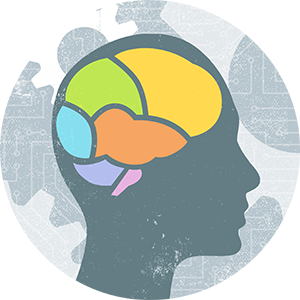Program Overview
The undergraduate minor in Cognitive Science is aimed to provide undergraduates with an introduction to cognitive science as a theory of the mind as an intelligent (information-processing) system. Our objectives are to ensure that each student (a) be able to articulate, at least in broad terms, some of the assumptions that have been thought to unify the various sub-fields within the domain of cognitive science; (b) explore more than one discipline’s approach to matters pertaining to cognitive science; and (c) explore in some detail at least one of the six main disciplines contributing to cognitive science (anthropology, biology, computer science, linguistics, philosophy, and psychology).
Minor Requirements
To receive an undergraduate minor in Cognitive Science, the student must successfully complete 18 credit hours to be distributed as follows:
- PHI 375 - Philosophy of Cognitive Science 3 Credit Hours
plus 15 credits from among the following:
- ANT 382 - Digital Archaeology 3 Credit Hours
- ANT 450 - Symbols and Culture 3 Credit Hours
- BIO 302 - Introduction to Neuroscience 3 Credit Hours
- BIO 375 - Behavioral Ecology and Sociobiology 3 Credit Hours
- BIO 535 - Comparative Neurobiology and Behavior 3 Credit Hours
- BIO 550 - Advanced Physiology 3 Credit Hours
- COM 350 - Language and Communication 3 Credit Hours
- CS 263 - AI in the World 3 Credit Hours
- CS 375 - Logic and Theory of Computing 3 Credit Hours (may not be combined with PHI 520)
- CS 460G - Machine Learning 3 Credit Hours
- CS 463G - Introduction to Artificial Intelligence 3 Credit Hours
- CS 465 - Introduction to Generative Artificial Intelligence Techniques 3 Credit Hours
- CS 575 - Models of Computation 3 Credit Hours (may not be combined with PHI 520)
- LIN 221 - Introduction to Linguistics 3 Credit Hours
- LIN 509 - Formal Semantics 3 Credit Hours
- LIN 510 - Corpus Linguistics 3 Credit Hours
- LIN 511 - Computational Linguistics 3 Credit Hours
- LIN 512 - Syntactic Analysis 3 Credit Hours
- LIN 515 - Phonological Analysis 3 Credit Hours
- PHI 320 - Symbolic Logic I 3 Credit Hours
- PHI 520 - Symbolic Logic II 3 Credit Hours (may not be combined with CS 375 or CS 575
- PHI 560 - Philosophy of Scientific Method 3 Credit Hours
- PHI 565 - Philosophy of Language 3 Credit Hours
- PHI 575 - Philosophy of Mind 3 Credit Hours
- PSY 311 - Learning and Cognition 3 Credit Hours
- PSY 312 - Brain and Behavior 3 Credit Hours
- PSY 323 - Developmental Psychology 3 Credit Hours *
- PSY 427 - Cognitive Processes 4 Credit Hours
- PSY 456 - Behavioral Neuroscience 4 Credit Hours
- PSY 562 - Advanced Topics in Cognitive Psychology: (Subtitle Required) 3 Credit Hours
- PSY 564 - Advanced Topics in Learning: (Subtitle Required) 3 Credit Hours
- PSY 565 - Advanced Topics in Neuroscience: (Subtitle Required) 3 Credit Hours
- PSY 566 - Advanced Topics in Social Psychology: (Subtitle Required) 3 Credit Hours *
Note:
Of the 15 credit hours from this list, (a) at least 6 credit hours must have the same prefix; and (b) no more than 6 credit hours with the same prefix will count towards this requirement.
*Only by approval of the Director of Cognitive Science. The main criterion for approval will be the extent to which the course, as taught during the semester for which the student seeks cognitive science credit, contains a sufficient amount of materials relevant to cognitive science. The Director will make this determination by consultation with relevant faculty from the department teaching the course (including the instructor of the course), in conjunction with the criteria for course inclusion outlined on the Cognitive Science webpage.
For more information, contact: Ruth Beattie, rebeat1@uky.edu


